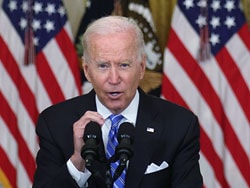President Joe Biden is pressing for a compromise on Medicare pharmaceutical negotiations, seeking to have the federal government use its bargaining clout only for certain drugs.

President Joe Biden
On Thursday, Biden held a press conference in which he discussed proposals for reining in pharmaceutical costs. He also spoke about creating penalties in cases in which pharmaceutical prices rise faster than inflation and about setting a cap on the amount people enrolled in Medicare pay out of pocket for drugs each year.
No immediate action was triggered by Biden’s comments. He sought to make a case for reducing how much Medicare pays drugmakers and for spending those savings in other ways, such as by expanding Medicare benefits to include dental care. Biden said he had earlier called for allowing Medicare to negotiate drug prices across the board. He is now backing efforts to create a framework by which to judge what Medicare should pay for a subset of expensive drugs for which there are no competitor drugs in the United States.
“Medicare is going to negotiate a fair price,” Biden said. “Right now, drug companies will set a price of whatever the market will bear.”
That more targeted approach that Biden is promoting meshes with ideas that have already been discussed in Congress, such as those in an outline released by Senate Finance Chairman Ron Wyden (D-OR) in June. Wyden would likely play a key role in shaping legislation that would change Medicare’s approach to purchasing medicines. In his outline, Wyden called for having Congress establish clear criteria for determining market failure; for estalishing which drugs prices would be negotiated; and for defining what constitutes a fair price.
“Medicare Has One Hand Tied Behind Its Back”
Like many who advocate having Medicare negotiate drug prices, Biden and Wyden emphasized how pharmaceutical purchases are an odd exception to how the health program pays for care.
Medicare sets the prices for payments for almost all medical care, albeit with significant feedback from the clinicians and companies involved. For the Medicare Part D pharmacy program, Congress assigned the work of negotiating prices to private insurers. For medicines covered by the Part B program, Medicare accepts the reported prices set by drugmakers.
“American families and taxpayers have been paying too much for prescription drugs while Medicare has one hand tied behind its back,” Wyden said in a Thursday statement. “It’s time to allow Medicare to use the bargaining power of 50 million American seniors to negotiate a fair price for drugs with manufacturers, especially when market forces have failed to keep prices down.”
For many years, there has been steady and significant Republican opposition to allowing Medicare to directly negotiate prices. Republicans often cite the Medicare Part D program as a successful model.
There is disagreement among Democrats about how to change Medicare’s approach to paying for drugs. Rep. Scott Peters (D-CA), for example, concurs with Biden about the need to cap out-of-pocket pharmaceutical costs for senior citizens. But he has criticized a proposal to peg Medicare payments to the prices paid for drugs in other wealthy nations, a plan that has been eyed several times as a platform for negotiations.
In June, Roll Call reported that Peters announced plans to vote against a major spending package if it included drug price negotiation provisions to help offset costs.
“If you institute it, you won’t have cures because you’ll dry up all the private investment that does that research,” Peters told Roll Call. “It’s a false promise of generating revenue because that industry is going to implode.”
The lawmaker’s comments were similar to those that Steve Ubl, chief executive officer of the Pharmaceutical Research and Manufacturers of America, offered on Thursday about Biden’s statements.
“Many in Congress know that access to medicine is critical for millions of patients, and Medicare is not a piggy bank to be raided to fund other, unrelated government programs. This is a misguided approach,” Ubl said. “The recent infrastructure bill is a reminder that bipartisan reform is possible, and patients deserve the same bipartisan leadership to help ensure they have access to their medicines with out-of-pocket costs that are affordable.”
Kerry Dooley Young is a freelance journalist based in Washington, DC. She is the core topic leader on patient safety issues for the Association of Health Care Journalists. Young earlier covered health policy and the federal budget for Congressional Quarterly/CQ Roll Call and the pharmaceutical industry and the Food and Drug Administration for Bloomberg. Follow her on Twitter at @kdooleyyoung.
For more news, follow Medscape on Facebook, Twitter, Instagram, and YouTube.
Source: Read Full Article
